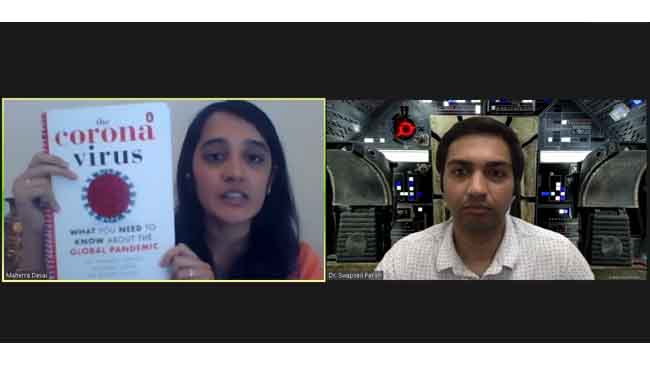
Kitaab brings in frontline launch of e-book “The Coronavirus”
Hyderabad, 18th May 2020.
Prabha Khaitan Foundation, an organization that is dedicated to the socio-cultural welfare and humanitarian cause had through its platform Kitaab, organized a virtual book launch of the e-book ‘The Coronavirus: What you Need to Know about the Global Pandemic’. The book is written by Dr Swapneil Parikh, co-founder DIY Health, Maherra Desai, clinical psychologist and medical researcher and Dr Rajesh Parikh, Director of Medical Research and Neuropsychiatry, Jaslok Hospital. Published by Penguin, the book takes the reader through the history of pandemics while giving some serious advice on how to keep oneself safe from the deadly virus. Kitaab, connects Asian writers with readers globally and provides a writing and publishing platform to emerging and seasoned writers from the region to express themselves creatively. Ms. Shama Deo, President of Spectrum - a Study group from Pune committed to learning gave the welcome note and moderated the session.
Written by frontline COVID-19 warriors, the book gives us an illustrated account of world’s tryst with pandemics and epidemics at various points in history and the challenges that are ahead of us now. With regard to this virtual session, Ms. Manisha Jain, Communications & Branding Chief, Prabha Khaitan Foundation stated, “Through this initiative, Prabha Foundation and Penguin endeavours to spread awareness on what needs to be known about the current global pandemic. Through this interactive session our discerning viewers and listeners were able to know credible and comprehensive information from professionals that helped us understand what this deadly virus is, and how we can prepare and protect ourselves against it, for the future of humankind.”
Dr Swapneil Parikh, who co-authored the book added, “This is the first book that addresses the history, evolution, facts and myths around the pandemic. Though the world now has enough technology and experience of pandemics and epidemics like SARS, E-bola, Swine flu, Zika, etc. still our inability or unwillingness to learn from past experience caused the delay to handle the situation.”
He further stated that, “We started writing the book in early February when the problem was perceived as Chinese and largely confined to Wuhan and Hubei province. WHO called it infodemic before calling it pandemic. By the end of February, the virus has spread globally, and the effect was enormous. Nothing on this scale has been experienced in living memory. One of the key learnings is that with any new pandemic we should assume that we have to deal with worst case scenario then only we can prepare ourselves ”
Throughout the hour-long engaging session, the doctors discussed about how we should prepare ourselves to deal with this global pandemic. They explained in detail the virus’s mechanism of action, and how it manages to dive deep into the lower respiratory tract, multiplies silently until its ‘discovery’ by the immune system. It is in the degree of the response, when the immune system itself hits panic mode that it launches a frenzied attack which, in more ways than one, can result in overkill. This severe respiratory disease can end up being detrimental to the aged, those with diabetes or cardiovascular disease, or have a history of smoking. They also discussed the modern history of viral contagions which shows that pandemics are those catastrophes when health care professionals are overwhelmed while doing their job. As they also try to save themselves, they become unwitting amplifiers of disease and turn into objects of fear — as numerous videos of doctors and healthcare workers being harassed attest to.Experts have predicted there will be a mental health crisis of epic proportions in the wake of the COVID-19 pandemic.
Ms. Maherra Desai, clinical psychologist and medical researcher stated in the virtual session, “A vast majority of Indians can’t access quality healthcare, and I hope when we come out of this danger, people start caring for those who have constantly suffered due to lack of basic medical facilities.” She has researched the effects of social media as the medium which is both a strength and weakness for public-at-large. Ms Desai added, “While the Chinese whistle blowed about the disease on the medium, social media also propagated misinformation, xenophobia, racism among other social evils which played onto people’s minds. Due to this pandemic, there will be long term psychological effect, half of the population is sequestered, over 1.2 billion children are not going to school. There will be a global food crisis at the end of this pandemic.”
Prabha Khaitan Foundation is devoted towards the promotion of literature culture and performing arts and collaborates with caregivers, committed individuals and like-minded institutions to implement cultural, educational, literary and social welfare projects in India. Kitaab is an initiative of Prabha Khaitan Foundation. Through this initiative PKF has launched books of Dr Shashi Tharoor, Vir Sanghvi, Pavan Verma, Salman Khurshid, Sunita Kohli to name a few.